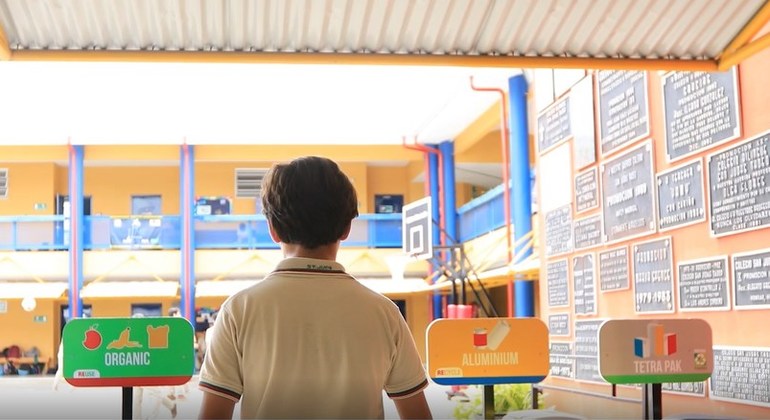A UN programme for schools is looking to make education a central part of the international response to climate change, and empower students with the knowledge they need to fight the crisis, and adapt to its impacts.
For Natukunda Edetruda, a student at Immaculate Heart School, Uganda, it is important for young people to play a key role in fighting climate change. “The future lies in the hands of the youth, and the youth have a role to play to either destroy it or to keep it. I believe that change begins with an individual and, as an individual, I believe that I should be empowered to protect the environment”.
Natakunda’s school is one of 258 educational establishments, in 25 countries, that took part in a pilot project organized by the UN Educational, Scientific and Cultural Organization (UNESCO) Associated Schools Network (ASPnet), aimed at integrating sustainability, including climate action, into every aspect of school life.
Students and teachers at Immaculate Heart school have taken part in a diverse range of sustainability-related activities, including using recycled glass to make glaze for use in ceramics classes, and constructing a water filter to prevent diseases associated with dirty water.
Other schools in the programme focused on improving the built environment. Waldorf School in Namibia has offset the environmental impact of the school building by planting trees and vegetation, and St. Jude School in Costa Rica has replaced its air conditioners with more environmentally-friendly alternatives, and the students of Cours Saint Marie de Hann in Senegal made a hanging garden from recycled bottles and tyres.
The feedback from schools has been extremely positive, demonstrating a number of positive outcomes. Participating schools greened their premises, improving water, waste and energy management, and the overall health and well-being of school communities; students and teachers developed a stronger environmental conscience, and a vision of how their schools and communities can become more sustainable, and resilient to climate change.
Schools can empower students to change their behaviour and take action for the planet Sabine Detzel, outgoing International Coordinator, UNESCO Associated Schools Network
“There is an enormous wave of optimism that comes out of a project like this’ says Sabine Detzel, outgoing International Coordinator of ASPnet. “You see that people are interested to engage and are ready to do things, and that schools, in a very short time, can be transformed so that they motivate and empower students to change their behaviour and take action for the planet”.
The success of the pilot project, which ran from 2016 to 2018, has prompted ASPnet to invite all its member institutions – some 11,500 schools in 180 countries – to adopt a similar approach and develop action plans to counter climate change at the local level.
Getting climate-ready
The UNESCO programme demonstrates the importance of making climate action a part of every aspect of school life, from teaching to the way schools are run, and the impact they have on the local community.
The agency has produced a guide for schools, called Getting Climate-Ready, which advocates for this “whole-school” approach. Several benefits have been identified by teachers, such as more meaningful and hands-on learning opportunities, significant reductions in the schools’ ecological footprints, and savings through more efficient use of resources.
For example, at Colégio Israelita Brasileiro, a school in Rio de Janeiro, everyone at the school, from janitors to teachers, students and support staff, participates in climate-related learning activities. These include building solar and bamboo bicycle racks, and converting used cooking oil into biodiesel. The activities have created bonds between different members of the school community, and brought about a sense of belonging and pride.
At the First Experimental Lyceum, a school in Gennadeio, Greece, an innovative approach has been taken to climate action teaching: biology and chemistry students worked in groups to investigate climate change, virus transmission and the dynamics of ecosystems, using computer simulations.
The findings were then applied to their school building, to find its environmental weaknesses and develop a plan to improve it. This approach was found to engage students, and enrich their knowledge about real-world problems.
Whilst some subjects have an obvious link to climate action (for example, geography and the sciences), the guide suggest ways that many other subjects can include the topic.
History, for example, can examine how societies have, in the past, reacted to environmental challenges. Language and literature classes can help students to develop the communication skills needed to respond to local and global issues, mathematics students can produce graphs showing the change in school energy use, and civics students can interview local officials on the actions they are taking to address the problem.
‘Almost all countries’ educating children about climate change
Encouragingly, nearly all countries have committed to climate change education, a UNESCO report released in December 2019 has revealed.
The study found that the most common commitment is to the raising of public awareness, and that cognitive learning is more commonly discussed (i.e. integrating climate knowledge into classroom teaching), rather than social and emotional or behavioural learning. However, it also showed that actual progress is currently hard to monitor, because of a lack of data.
The UN is calling for nothing less than a transformation of the global economy in which technology, science, finance and ingenuity are all focused on ensuring a sustainable future for all.
However, this will only happen if school-leavers have the skills needed to answer the demands of this new, greener economy, and that will require strong leadership from all sectors of society, including governments, international organizations, the private sector and civil society.





